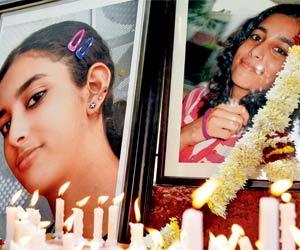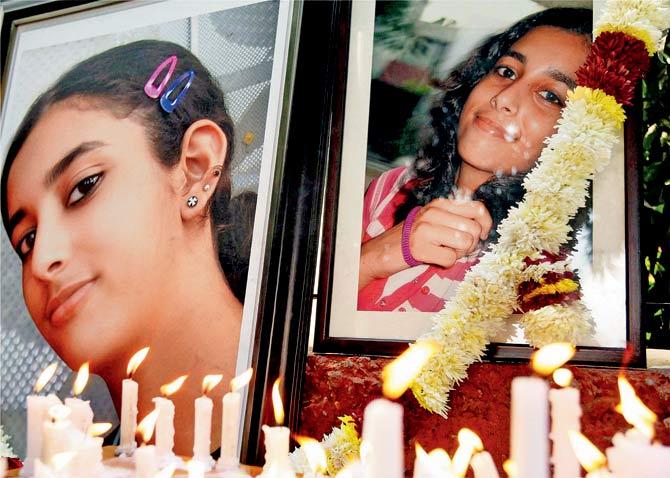Mayurica Biswas's Beyond Reasonable Doubt brilliantly recaptures the twists and U-turns of a case that continues to mock and shock India

 What is it about the murder of Noida's 14-year-old Aarushi Talwar, and the family's domestic help, Hemraj Banjade, on May 16, 2008, that haunts urban India still - especially in a country where human lives rarely matter, until deaths swell up to a quotable statistic? Surely there are many reasons.
What is it about the murder of Noida's 14-year-old Aarushi Talwar, and the family's domestic help, Hemraj Banjade, on May 16, 2008, that haunts urban India still - especially in a country where human lives rarely matter, until deaths swell up to a quotable statistic? Surely there are many reasons.
Journalist Avirook Sen ends the introduction of his book, Aarushi, referring to how astronaut Rakesh Sharma, when asked by Prime Minister Indira Gandhi what India looked like from space, had famously said, "Saare jahaan se accha (better than all the world)." His book (or the case) reveals "how it looks from the ground."
 Aarushi Talwar's parents were acquitted of her murder earlier this month
Aarushi Talwar's parents were acquitted of her murder earlier this month
Sen's bestseller (also a podcast series), mainly researched from case documents and proceedings in Ghaziabad sessions court, argues vehemently against the arrest of Aarushi's parents, Rajesh and Nupur's Talwar for the said double-murder. It shows that there are indeed two Indias - which would be a comfortable cliché to live with, if one wasn't vested with the authority to pre-judge the other, and punish thereby. The Uttar Pradesh police that botched the investigation initially, and fabricated theories later, from a pre-fixed moral stand-point - swinging couple, teenaged romance, pre-marital sex, honour killing - were easily the book's chief villains.
Meghna Gulzar's Talvar (2015), a fab feature film on the double-murder, written by Vishal Bhardwaj, arrived at the same conclusion as Sen's book. The movie, I'm told, was based on extensive interviews with cop Arun Kumar from the CBI, who had steered the investigation to a different direction - before being transferred from the case. There's yet another mainstream Hindi picture, Kay Kay Menon-starrer Rahasya (2015), on the same subject, which was far more rhetorical and hyperbolic in its approach.
Of all of them, the visual story-telling that stands out instantly, and shakes you up to the core, has got to be Mayurica Biswas's documentary, Beyond Reasonable Doubt. The four-part series (each episode of about 50 minutes), commissioned by Singapore's Channel News Asia, dropped on its official site last week. While Biswas enjoys the benefit of a lot of research that's already in public domain, it's the immediacy of the images - putting real faces and voices to actual names in the case - that hits you right away, like nothing else can.
You can see young Aarushi from a selfie taken at 10.30 pm, on the night she died, only around an hour later. Video footage captures the life of the Talwars in good times. As do tonnes of photographs of Aarushi, shot by her best friend Fiza, now 22, and for whom Aarushi herself has "turned into an abstraction - a character whose story is recurrently being rewritten."
Camera, stationed every so often in the Talwars' home and neighbourhood, pans across the bloodied scene of crime, as dead bodies are brought out, the helpless father walks alongside (he's later assaulted by a cleaver knife outside the courtroom). Much of the footage flits between fresh interviews, home videos, and archival news footage. Of the latter, of course, there are far too many, given that the crime took place in Noida - pretty much the headquarters of Indian television news. This is also why it got that sort of play. The story was wholly designed by God to suit the channels' prime-time, middle-class TG (target group).
Documentaries about individuals and events automatically take a completely novel shape, when so much of urban life is already almost a Truman Show. I realised this first while viewing Asif Kapadia's doc Amy (2015), which seemed as good as walking through Amy Winehouse's hard-drive on her computer, or a furiously updated Facebook/ Twitter/Instagram account.
The lawyers, investigators, sympathisers, and victims in Biswas's film reveal, in equal measure, their valid points, and prejudices. The filmmakers independently verify assertions - right from body language, to the choice of the murder weapon - with proven experts. They stick to basic journalism as well, allowing every possible theory the space it deserves.
The Talwars were finally acquitted by the Allahabad High Court for lack of conclusive evidence that proves beyond doubt that they were really the monster-parents who killed their daughter and the cook. A needle of suspicion points strongly at the compounder, Krishna. But we still don't know the motive, of the purported murderer, or for that matter, the CBI - India's top investigative agency - that went after the Talwars. This is a classic urban crime mind-bender with all the twists and U-turns to befit, as I'm told, yet another documentary series, this time produced by HBO, that will screen on Star World/Hotstar soon.
All we know is there were four people in a house, last seen together at 10 pm. Two were dead by morning. This was a regular metropolitan neighbourhood, no different from mine. I had the eerie background score jarring through my headphones as I watched Beyond Reasonable Doubt - home alone, late in the night, assuming once in a while that my bedroom door was creaking. Horror doesn't scare me at all. This stuff's real. I kept the lights on throughout.
Mayank Shekhar attempts to make sense of mass culture. He tweets @mayankw14. Send your feedback to mailbag@mid-day.com
 Subscribe today by clicking the link and stay updated with the latest news!" Click here!
Subscribe today by clicking the link and stay updated with the latest news!" Click here!









